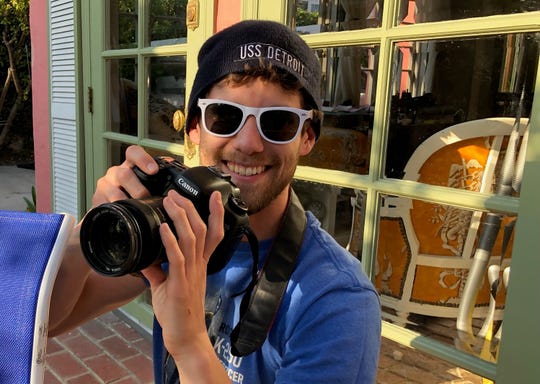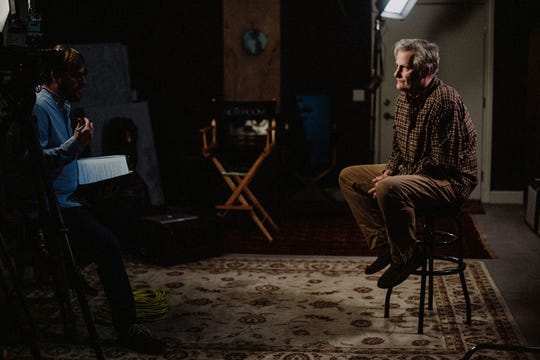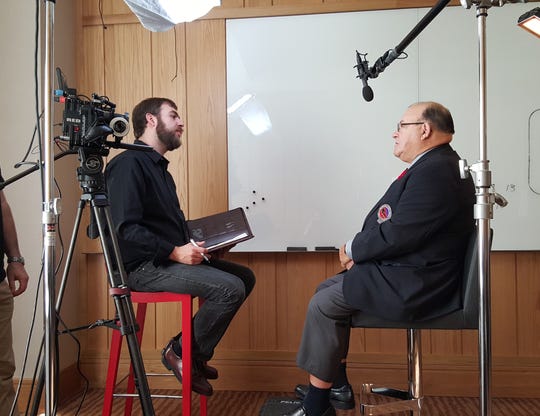Carol Cain, Free Press Business Columnist Published 6:30 a.m. ET March 30, 2019 | Updated 10:11 a.m. ET April 8, 2019
Every so often someone asks if Michigan should bring back the film incentives. They recall the impact and vibe the program gave the region for film and TV production, during the period when they were the most lucrative in the United States.
The incentives were launched by then-Gov. Jennifer Granholm in 2008 to help an ailing state, capped by Gov. Rick Snyder in 2011 and ended entirely in 2015.
But with a new governor and legislature in place, might this be the time to reconsider the incentives in some form?

Kale Davidoff (Photo: Chris Gaede)
Lots of folks, including “New Money” producer Kale Davidoff and “The Russian Five “ documentary director Joshua Riehl, both raised in Michigan, would love to see that happen. They say it would support the important artistic, creative industry that was catching on when the incentives ended.
The story of film incentives in Michigan has certainly come full circle. In 2008 the state was in crisis as the auto industry was in shambles and Detroit on the financial brink amid foreclosures galore, and young people bailing out with few job prospects here.
Granholm came up with an idea of offering the most lucrative film tax incentives in the nation (up to 42 percent) to inspire more film work and hopefully economic development. The Legislature gave its blessing.
It clicked. Big-ticket movies and stars including Clint Eastwood, Faye Dunaway, Jack Nicholson and Al Pacino descended on Detroit, Ann Arbor and Traverse City. Movie production houses popped up in Pontiac and other locations.
Flash forward a few years later under Snyder, who put the state’s budget under a microscope and determined the incentives didn’t provide return on the state’s investment.
The state awarded $400 million in incentives during those years, according to the Michigan Economic Development Corp.
“The program no longer exists, but the Michigan Film & Digital Media Office continues to retain and attract local and out-of-state productions by promoting Michigan’s diverse locations and growing local partnerships to support production activity,” said Otie McKinley, a MEDC spokesman.
Davidoff produced his first film in Michigan, minus any incentives.
“I have wanted to make films since I was a little kid,” said Davidoff. “It was after high school when the Michigan film incentives offered me the opportunity to work in the production offices of films (being done in Michigan) like 'LOL' and 'Youth in Revolt' that I discovered what it meant to work under producers and production management,” Davidoff said.
Forced to move to LA
That first film, “New Money," telling the story of a family dealing with wealth, drugs and the cost of education, will be available April 16 on Blu-Ray/DVD and streaming platforms including Amazon and iTunes. It is being released by Gravitas Ventures.
“I worked in the film industry in Michigan from 2008 to 2016 but was forced to move to LA after the dissolution of the incentives,” he said. “It was devastating. Most people I knew in the industry are either no longer doing it or don’t do it in Michigan.”
Davidoff added: “There were a lot of politicians integral in removing the incentives who would claim that they didn’t want to pick winners and losers, but we know they do that anyway for other industries.
“I think a lot of politicians wanted to keep ‘Hollywood’ out of Michigan, but what they really did when they got rid of the incentives was kick a person in Wyandotte out of a job, make a business in Pontiac question a renovation investment, and convince a talented kid from Detroit that he or she has to move elsewhere to tell his or her story.”
“New Money” was filmed here because Davidoff and Jason Kohl, the director who grew up in East Lansing and lives in Germany, wanted it done here. They found their own financing.
Not having incentives is a major impediment when states including Georgia are dangling millions. Georgia has invested $800 million in tax credits, which the governor has said led to $2.7 billion in spending through things such as hotel rooms and auto rentals.
"Unless you’re making a very small movie, it’s very difficult to convince investors to give up the 25-30 percent they might get back in another location," said Kohl.
He added, "I still want to tell Michigan stories, but have accepted that I will have to shoot those stories predominantly in Canada and Ohio, which have incentives. Something I wanted to say when they killed the incentive: Gov. Snyder’s commission pretended like the film industry was supposed to create permanent, 9-5 jobs, like in a car factory. That’s not how film works. People work on multiple films, of multiple budgets, in the course of a year. It’s a freelance industry, but that doesn’t mean it doesn’t have a massive impact on an economy."
As of 2018, 31 states offered some sort of film tax incentive, according to the National Conference of State Legislatures.
For Michigan to reconsider them now leaders would need to weigh, “whether incentivizing the movie industry is worth what they get in exchange” said Meredith Jordan, an author who has written about them. Leaders make such assessments on things like stadiums and other major projects.
“Tax credits have reshaped the face of movie production in the United States,” said Jordan, author of "Below The Line: Anatomy of a Successful Movie.”
Bad timing
“Unfortunately we missed out on the incentives,” said Joshua Riehl, a film director from Port Huron. “The week I moved back to Michigan from Austin, Texas, where I went to film school, in order to seek funding for the ("The Russian Five”) documentary, they killed the incentives.”
He spent seven years bringing his documentary to life.
Riehl grew up wanting to be a filmmaker but a serious car accident stalled his plans. As he recuperated, his grandparents gave him a Detroit Red Wings Vladimir Konstantinov jersey — his favorite player. It inspired him to tell the story of how Konstantinov and four other Russians came to play for the Wings. He worked with Jenny Feterovich, a local producer, and Dan Milstein of Gold Star Mortgages to finish the film.

Director Joshua Riehl interviews actor Jeff Daniels at his Chelsea Studio. (Photo: Meghan Melia)
“I put my heart, soul and seven years of my life into making 'The Russian Five' to tell the ultimate Detroit underdog story, but as much as I've loved being back home around family and friends and the Great Lakes, the challenges of developing and maintaining a career in the film industry in Michigan are daunting,” Riehl said.
“Professionally, I'd be better off building off of the success of 'The Russian Five' by moving back to Austin or going to Los Angeles,” he said. “But Michigan is home and I want to build something here, much like Richard Linklater did in Austin, Texas.

Director Joshua Riehl interviews coach Scotty Bowman at the 2015 Hall of Fame Inductions. (Photo: Gold Star Films, LLC)
“At the same time, if that remains an arduous task, I won't hesitate to leave because as much as I love Michigan, I like being able to pay my rent just a little bit more,” he added.
Davidoff will also continue his battle of convincing people to invest in films here.
“Whether through grants, incentives, private financing, art needs support. And Michigan, like any state or region facing existential challenges and changes, needs art,” Davidoff said.“If you build that support, the business side of it will come.”
Contact Carol Cain: 313-222-6732 or clcain@cbs.com. She is senior producer/host of "Michigan Matters,” which airs 11:30 a.m. Sundays on CBS 62. See L. Brooks Patterson (recorded before news last week of his illness), Milan Stevanovich, Mike Brennan and Michael Noblett on this Sunday’s show